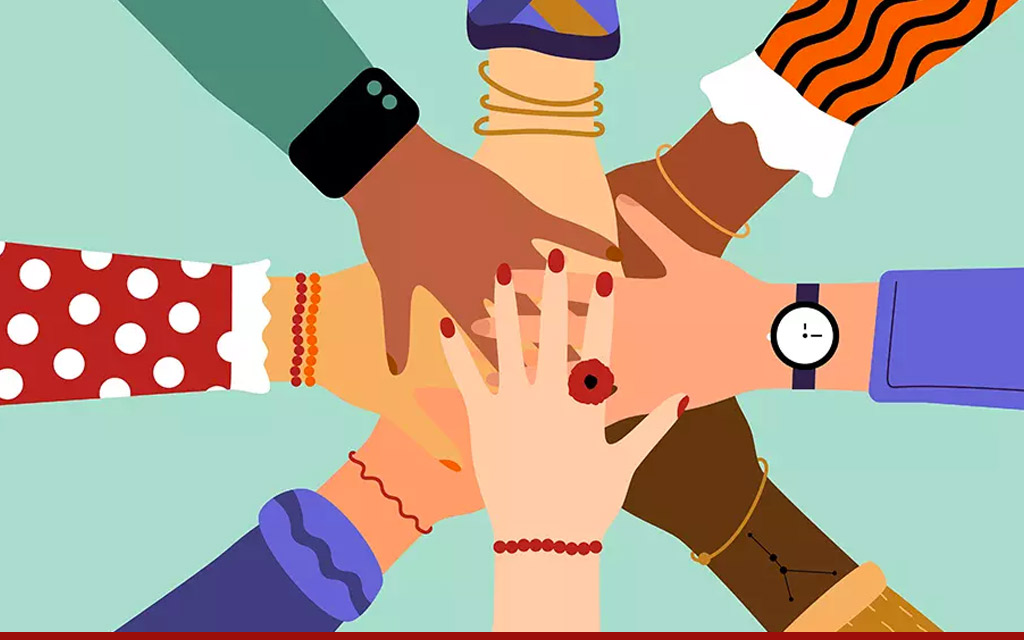Bringing people together effectively has become an increasingly important component of corporate strategy and employee retention. In a post-pandemic world, community building became elevated to an art form.
We are hunters when it comes to information, but we are gatherers when it comes to connections and collaboration. Communities in both the physical and virtual worlds have been around since people first gathered. But in a post-pandemic world, community building became elevated to an art form. Bringing people together effectively has become an increasingly important component of corporate work strategy, employee retention and building loyal clients. Job postings for community managers are on the rise, colleges are beginning to offer community-building skills in the curriculum, and a new generation of workers are turning to their social communities for answers to all sorts of questions–from remedying a problem in the office to what to wear and even whether to remain in their jobs.
Working From Home Elevated Our Need for Community
“Community in the corporate world has to bridge the gap from KPIs (Key Performance Indicators) to making people feel empowered, nurtured and listened to while at work. To build community in hybrid times, corporates need to build a connective tissue beyond physical spaces,” says Felix Zeltner, who runs Remote Daily, a community-building program he offers to corporations and social groups.
“The pandemic years show increased efficiency, output and revenue for many corporates, mainly because knowledge workers were and still are able to attend more meetings and work more hours. However, all the factors that nurture corporate culture and community – belonging, connection, inclusivity, to just name three – have crumbled since 2020, and eventually the effect snowballed, turning into attrition skyrocketing, aka The Great Resignation,” says Zeltner.
Freeman Co., the largest events logistics company with offices spread across the world and a workforce covering a vast swath of skills, recently hired Sherry Huss as its first Head of Community. Reflecting on what has long been called the key pillar for media companies, Huss says, “Content may be king but community is cosmic; it’s the magic ingredient.”
“It’s like political organizing,” continues Huss, thinking back on her days as the community glue at MakerFaire, which celebrates and gathers the maker community. “You find your evangelgists and empower them.”
Huss has turned her community-building efforts at Freeman into a science. She divvies her job into three areas: internal community, where the workforce feels heard and connected; internal/external where she extends the envelope, inviting everyone from young job seekers to potential partners into the fold; and external outreach to keep Freeman’s clients feeling like family and not just clients.
Empathy as a Job Qualification
So what are the qualifications for a good community manager? It’s basic, and at the same time profound: empathy, and making people feel heard. Denise Hayman Loa left a cushy Wall Street life to co-found Carii, Inc & Connective, a platform to spur the growth of communities. “Our communities range from those interested in outer space to crypto and NFTs. We host hundreds of them, and the community administrators come from all sorts of educational backgrounds. It’s less of a tech job, and more of an empathy job. Listening to your members, fostering meaningful conversations and creating conversations and events that make them come back for more,” says Hayman Loa.
Zeltner concurs. As a leader, you need empathy. It allows you to understand that the people you work with live different lives than your own. Just because you dedicate your life to the organization and love being at the office where you can bathe in your inner circle and strike up casual conversations doesn’t mean that everyone else necessarily feels the same way (especially Black women). Once you accept that, you can start building culture, by allowing for spaces that enable real talk.
“As a community manager, you need to be able to connect with everybody you’re working with individually,” continues Zeltner. And no shop is too large not to engage their employees. Explains Zeltner: “On a recent episode of Remote Daily, Dan Black, head of talent at EY, an organization with 300,000+ employees, said they hired 160,000 people last year and were still able to have one-on-ones with everyone – incoming and currently employed – about how to support them to do their best work. This listening on a granular level just didn’t exist in most pre-pandemic corporates.”
Does Community Have a Measurable ROI?
According to CMX, an association for community builders, 22% of corporate respondents in its survey report having a dedicated community department, up from 15% last year. Community job descriptions are also becoming more specialized, with 35% of teams having at least one person focused full-time on community operations. A full 87% agree community is critical to their company’s mission, and 79% believe community has had a positive impact on their organization’s objectives. But only 10% say they can financially quantify the value of their community and only one-third can connect their community data to their customer data.
Freeman’s Huss says that depending on a community’s purpose, the relevant metrics can include its number of members, number of social posts, quality of the engagement, the impact of the community (new programs), as well as special events and working groups. Clearly one of the most important outcomes of community is employee retention. Think of community as the new fusbol table.
Hayman Loa’s community at Carii bakes in a gamification strategy, where you earn tokens for your involvement, whether it’s in the form of a post, offering advice, or inviting a new member. The administrator’s dashboard provides an easy visual that shows what the community drivers and behaviors are.
Setting Up Shop
There are two schools of thought about where to base your community. Many subscribe to the “go where the traffic goes” theory, using platforms like Discord, Slack, Facebook, LinkedIn Groups and Reddit’s Community Hubs. People are trained to browse such eclectic digital spaces. Others find that these aggregators make discovery unwieldy and participation less likely. Plus–you don’t own your community.
Another way to go is with a bespoke community platform, eliminating the noise and distraction of competing communities and adding more branding, but it requires some administrative training. Platforms like Carii Connective Network, Gradual, HiveBrite, and Tribes also make it considerably easier to analyze what’s working and what’s not. These platforms are each built from the ground up to help manage users, offer insights and analytics on where they’re engaging, collect dues, sell tickets and merchandise, and offer a way for you to white label your own community.
Jerry Li’s company Gradual considers itself a one stop shop for all things community. Gradual white labels its tools, which include events for communities of all shapes and sizes, from CTOs and VPs to Thrifters and Neuro geeks. He sees community as the natural extension of events held on the platform. “People come to the event, but they stay for the community,” says Li.
Huss, who uses tools like Discord, Teams, and Zoom, is less convinced you need the training and administrative work of managing a dedicated platform. Laughing, she says her job is almost like an archeologist’s, uncovering corporate programs, shared history, and best practices that all existed somewhere inside the vastness of the company, but needed to be shared.
It is not easy to build a community. It requires commitment and a leap of faith that engagement leads to better business. It requires staff and structure. But Web 3.0 is churning in the periphery. The need for transparency and authenticity is of paramount importance for a new generation of workers. And work-from-home versus work-from-office remains an unsettled challenge. So the challenging and often difficult task of community building is now critical to every workplace.




